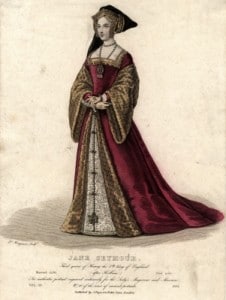 On this day in 1536, while his wife was imprisoned in the Tower of London waiting to be tried for treason, King Henry VIII sent Sir Nicholas Carew to take Jane Seymour to a house in Chelsea, a property that was within a mile of his own lodgings. Until this point, the King had kept his distance from Jane, not wanting to add to the gossip about how he was looking to replace Anne with Jane. Previously, he’d had Jane moved out of London to Carew’s country home1 and had spent his time gallivanting with other women, but now he wanted Jane close by. This move to bring Jane close to him must surely suggest that he knew that Anne was on her way out.
On this day in 1536, while his wife was imprisoned in the Tower of London waiting to be tried for treason, King Henry VIII sent Sir Nicholas Carew to take Jane Seymour to a house in Chelsea, a property that was within a mile of his own lodgings. Until this point, the King had kept his distance from Jane, not wanting to add to the gossip about how he was looking to replace Anne with Jane. Previously, he’d had Jane moved out of London to Carew’s country home1 and had spent his time gallivanting with other women, but now he wanted Jane close by. This move to bring Jane close to him must surely suggest that he knew that Anne was on her way out.
Eustace Chapuys, the imperial ambassador, recorded that Jane was now “most richly dressed” and “splendidly served by the King’s cook and other officers”,2 so, like Anne before her, Jane was being treated like the Queen when there was still someone filling that position. Jane’s feelings are unknown but I often wonder how she felt about the events of May 1536, it obviously made her very aware of how brutal the King could be to a woman he had once loved.
Also on this day in 1536, Thomas Cromwell wrote to Stephen Gardiner and John Wallop, the King’s ambassadors in France, informing them of recent events.3 He wrote that “The Queen’s incontinent [lacking self-control] living was so rank and common that the ladies of her privy chamber could not conceal it”, that “there brake out a certain conspiracy of the King’s death, which extended so far that all we that had the examination of it quaked at the danger his Grace was in, and on our knees gave him (God ?) laud and praise that he had preserved him so long from it” and that he couldn’t give them any more details because they were “so abominable”. He went on to tell them of how the four men had been condemned to death and that Anne and her brother “will undoubtedly go the same way”. As I have said before, Cromwell wasn’t psychic but he knew that Anne and George’s trial had been prejudiced by the trials of the four men and he must have been confident that the jury would do what he and the King desired, i.e. find Anne and George guilty.
In this letter, Cromwell also refers to the goings-on as “the King’s proceeding”, rather than taking the credit for Anne’s downfall. His biographer John Schofield4 uses this as evidence that Cromwell was commissioned by Henry VIII to do what was needed to remove Anne Boleyn and to replace her with his new love, Jane Seymour. However, it could be that Cromwell did not want Gardiner and Wallop to know of his precise involvement in the plot, or that it was a plot rather than an investigation. I agree with Schofield, I believe that the buck has to stop with Henry, but what do you think?
Regarding the property at Chelsea, Gareth Russell5 points out that this mansion was once the home of Sir Thomas More and was “a luxurious mansion… Set in 27 acres of grounds, which included an orchard and boat-house… it boasted a magnificent 70ft hall with views over the river, an opulently-appointed chapel and a well-stocked library.” You can find out more about the property at The Site of Beaufort House.
Notes and Sources
- LP x. 908
- Ibid.
- LP x. 873
- Schofield, J. The Rise and Fall of Thomas Cromwell: Henry VIII’s Most Faithful Servant.
- Russell, Gareth. Mistress Seymour’s New Lodgings, May 2010.